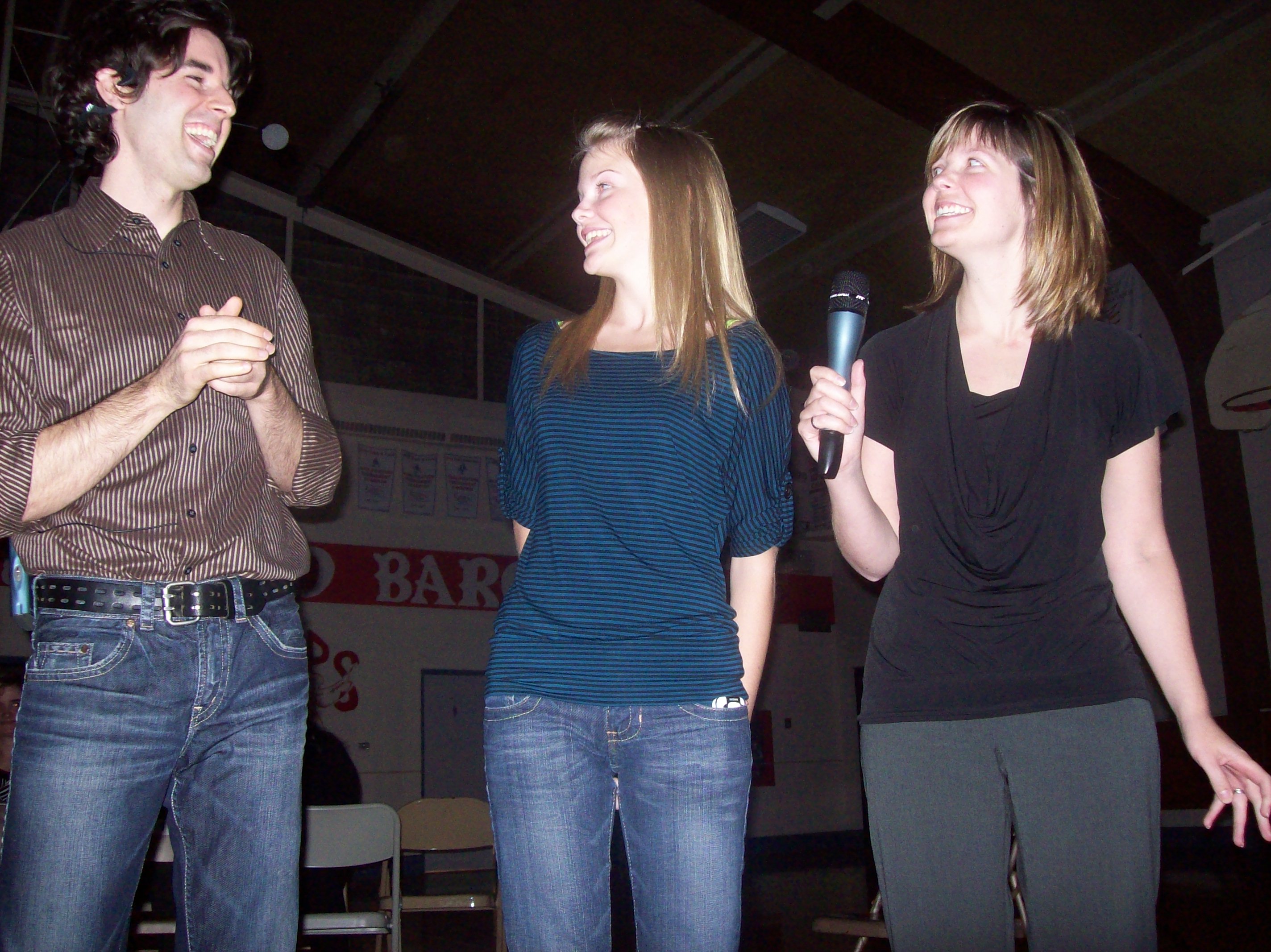Youth have key role in climate change fight: author
The Telegram (St. John's)
Provincial, Tuesday, November 17, 2009, p. A5

David Noble encourages Level III student Amy Grainger (centre) and Environment and Conservation Minister Charlene Johnson to kick off his presentation by leading Bishops College high school students in a song about the global climate crisis. - Photo by Danette Dooley/Special to the Telegram
Author, advocate and adventurer David Noble opened his talk at Bishops College in St. John's Monday afternoon by asking the provincial minister of environment and conservation to lead students in a karaoke song about global warming.
After the first few lines rolled up on the large white screen in the middle of the gymnasium, it became obvious that Charlene Johnson would likely starve if asked to sing for her supper.
However, the minister grabbed the high school students' attention with her remarks when she suggested that - where climate-change issues are concerned - these teenagers could teach their parents a thing or two.
Johnson encouraged them to lead by example, suggesting students walk to school, continue recycling, discontinue idling vehicles, and turn off lights and computers when not in use.
"Often it's your parents telling you what to do, but this is a time when you can reverse the role," she said.
Noble, who lives in Ontario, founded 2degreesC in 2003. The organization is taking action and transforming change in response to the global climate crisis.
Noble has taken his message to more than 18 countries and to six of the seven continents.
His slide show presentation Monday included photos taken during his trips to the Arctic with a group of artists and scientists, including Canadian musicians Feist and Martha Wainright.
The climate crisis is a cultural problem, Noble said.
While the role of governments and businesses must not be underestimated, he said, solutions to the climate crisis extend much further.
"We need to point our fingers at our governments and businesses to do more, but we also need to point our fingers right back at ourselves and say we need to do more, all of us, as well," he said.
Noble told several stories of how young people became activists and thus instigated change.
One such story was of a high school student in the United States who built an organic vegetable garden on school grounds.
"The first day that there was produce for sale in the school cafeteria, 76 kids lined up to buy an organic salad," Noble said.
The idea took off in other schools in the United States as well as in Africa. There are young people everywhere, Noble said, who can lead other projects to bring about change.
Climate change is and should be presented as a "right and wrong" issue, Noble said, rather than an economic issue.
"What about the ethics of this? What about the morality? What if we don't do it? We're no longer talking about tens of millions of people impacted ... we're talking into the billions of people who are going to be displaced, are going to die or are going to be affected by diseases," he said.
Noble's talks in St. John's are sponsored by the Newfoundland and Labrador Climate Action Coalition. The coalition includes the Newfoundland and Labrador Environment Network, the Sierra Club of Canada, MUN Oxfam, the MUN Students' Union, Project Green and Oxfam Canada.
Bill Hynd, campaigns co-ordinator with Oxfam Canada sees the global climate crisis as a human rights issue.
"It's about people's right to life being impacted, because, in a large part, of our own lifestyle," Hynd said.
From Oxfam's perspective, he said, it's a development issue. "In places like East Africa they're facing a major drought. In Bangladesh it means floods. And we're working with communities to help them address these issues."
Piotr Trela of the Newfoundland and Labrador Sierra Club said lack of response to climate crisis in this generation will have detrimental effects on the next generation. "We get all the benefits, they'll get all the consequences," Trela said.
Noble said having youth as climate change activists is crucial.
"We're not going to solve climate change in one year or two years or five years or 10 years. This is going to take a sustained effort. By virtue of young people having the longest living still ahead of them, they will have the opportunity, over time, to contribute most to this issue."
Noble will host a public discussion called "Where Climate Change Meets Sustainable Inspiration" tonight at 7:30 at the Johnson GEO Centre on Signal Hill Road. Admission is free.
© 2009 The Telegram (St. John's). All rights reserved.
